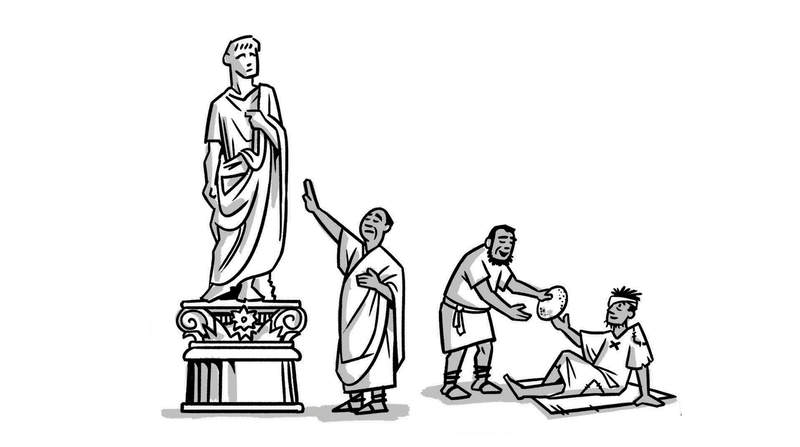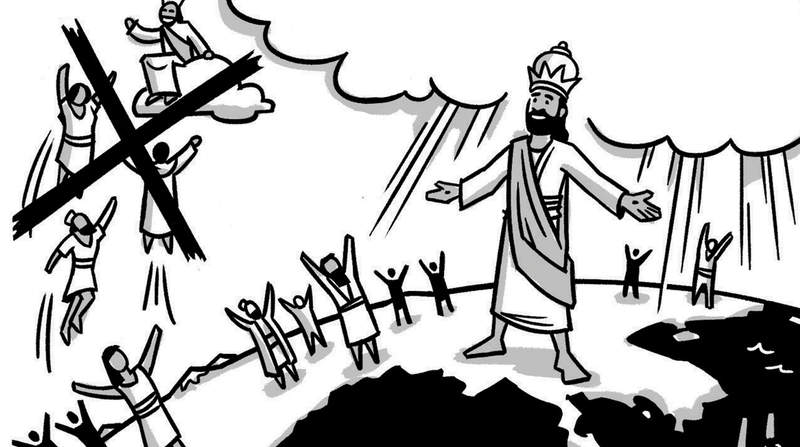The Book of Philippians
About

The church in Philippi was the first Jesus community that Paul started in eastern Europe (Acts 16). Philippi was a Roman colony in ancient Macedonia full of retired soldiers and well-known for its patriotic nationalism. So Paul faced resistance there for announcing Jesus as the true King of the world. After Paul had moved on, those who became followers of Jesus continued to suffer persecution, but they remained a vibrant community, faithful to the way of Jesus.
Paul sent this letter to them during one of his many imprisonments for a very practical reason. The Philippians had sent one of their members, Epaphroditus, to take a financial gift to Paul and to support him in prison. Paul sent this letter back with Epaphroditus to say thanks for the generous gift and address the community.
The design of this letter does not develop one singular idea from the beginning to end like some of Paul’s other letters do. Instead, Paul has arranged a series of short, reflective essays or vignettes, all revolving around the center of gravity in this letter, the poem in chapter 2. It artistically retells the story of the Messiah’s incarnation, life, death, resurrection, and exaltation. In each of the letter’s vignettes, Paul takes up key words and ideas from the poem to show how living as a Christian means seeing your own story as a lived expression of Jesus’ story.
Who Wrote the Book of Philippians?
Context
Key Themes
- Imitation of Jesus through humble service
- The hope for the resurrection life
- God’s gift of peace in difficulty
Structure
Philippians 1:1-26: Paul’s Gratefulness for the Philippians
Chapter 1 opens with a prayer of gratefulness, as Paul thanks God for the Philippians’ generosity and faithfulness. He expresses his confidence that the life-transforming work that God has begun in them will continue to grow into greater, more beautiful expressions of faithfulness and love.
Paul turns the focus onto the obvious concern at the moment, his status in prison. While being in a Roman prison isn’t exactly fun, it has paradoxically been beneficial for advancing the good news about Jesus. All the Roman guards and administrators know that Paul is in prison for announcing Jesus as the risen Lord. Additionally, his imprisonment has inspired confidence in other Christians to talk about Jesus more openly.
While Paul is optimistic that he’ll be released from prison, it’s still possible that he could be executed instead. As he reflects more on that fact, he decides that dying would actually be better than living. “For me, life is the Messiah, and so dying would be a gain” (Phi. 1:21). For Paul, his life in the present and the future is defined by the life and love of Jesus. If he is executed, he would be with Jesus, which would be great for him. But if he’s released, he could keep working to start more Jesus communities, which is better for others. Notice his train of thought here. Dying for Jesus is not the real sacrifice for Paul, it’s staying alive to serve others. It’s his way of participating in the story of Jesus, who suffered in order to love others more than himself.
Philippians 1:27-2:18: Imitating Jesus in Mindset and Action
Paul turns his attention to the Philippians, urging them to participate in Jesus’ example by taking up the same mindset. He tells them that their “life as citizens should be consistent with the good news about the Messiah” (Phil. 1:27).
This leads Paul into the great poem of chapter 2. It’s rich with echoes of key Old Testament texts, specifically the story of Adam and his rebellion in Genesis 1-3, as well as the poems about the suffering servant from Isaiah 45 and 52-53. This poem is worth committing to memory. It’s a beautifully condensed version of the Gospel story.
Before he became human, the Messiah preexisted in a state of glory equal to God (Phil. 2:6). Unlike Adam, who tried to seize equality with God, the Messiah chose to not exploit his equal status for self-advantage. Instead, he emptied himself of status to become a human, a servant to all. He even allowed himself to be humiliated and was obedient to the Father by going to his death on a Roman execution rack. Through God’s power and grace, the Messiah’s shameful death was reversed through the resurrection, highly exalting Jesus as King of all. He was given the name above all names so that all creation could now recognize that “Jesus the Messiah is Lord, to the glory of God the Father.”
This last statement is astounding because Paul is quoting from Isaiah 45:23, a passage in which all creation recognizes the God of Israel as Lord. Paul’s point is clear: In the crucified and risen Jesus, we discover that the one true God of Israel consists of God the Father and the Lord Jesus. For Paul, this poem expresses his convictions about who Jesus is, but it does more than that. It offers the example of Jesus as a way of life that his followers are to imitate.

Philippians 2:19-30: Living Out Jesus’ Story
Paul immediately follows up this idea of imitating Jesus with two stories about Timothy and Epaphroditus because they’re both examples of people living out Jesus’ story. Timothy is like Jesus in that he is constantly concerned for the well-being of others more than himself, making sacrifices to serve them. Epaphroditus, whom the Philippians sent with their gift, ended up risking his life to serve Paul in prison. He got so sick that he almost died while helping Paul. Thankfully, God had mercy on him, sparing Paul the loss of a friend. Paul’s point is that these kinds of people are living, breathing examples of the life and story of Jesus and are worthy of imitation.
Philippians 3:1-4:1: Paul’s Life Imitating Jesus
Paul then turns to his own story as an example. The Christians that had demanded circumcision of non-Jews (remember the book of Galatians) are still stirring up trouble for Paul. They remind him of his own troubled past when he was a persecutor of Jesus’ followers and tried to show his right standing before God by zealous obedience to the Torah. Like Jesus, Paul gave up his status and honor, now regarding it all as filth (the Greek word he uses is less polite!). He became a servant like Jesus, participating in his suffering and sacrificial love. Paul does it all in the hope that the grace and love of Jesus will carry him through death and out the other side into resurrection life.
Paul says that, for followers of Jesus, their true citizenship is in heaven (Phil.s 3:20). For Paul, this does not mean that we all should hope to get away from Earth and go to Heaven. Rather, Heaven is the transcendent place where Jesus is King of creation. Paul says that we’re eagerly waiting for our royal savior to come from there and return here, bringing his healing justice and transforming love to bring about a new creation.

Philippians 4:2-23: Living Humbly and With Hope
Paul challenges the Philippians to keep living out Jesus’ story and addresses two prominent women leaders in the church that had worked alongside him. They’re in some kind of conflict, so Paul pleads with them to follow Jesus’ example of humility, reconcile, and become unified. Paul also urges the Philippians to not give into fear but, in their persecution, vent all their emotions and needs to God who will give them peace. That peace, Paul says, comes by focusing your thoughts on what is good and lovely. There’s always something you could complain about, but a follower of Jesus knows that all of life is a gift. We can choose to see beauty and grace in any situation.
This leads to the conclusion of the letter. Paul again thanks the Philippians for their sacrificial gift, and he wants them to know that his imprisonments and times of poverty are not true hardships. They’ve become his greatest teachers, showing him that, no matter the circumstances, there is a secret to gaining contentment. It is simple dependence on “the one who strengthens” him (Phil. 4:12-13).Paul has come to view his suffering as a participation in the story of Jesus.
This letter to the Philippians gives us a unique window into Paul’s heart and mind. He saw his entire life as a reenactment of Jesus’ story. You can easily sense his connection to the Messiah and his awareness that Jesus’ love and presence is closer than even his own skin. That’s what gave him hope and humility in his darkest hours. Paul shows us that knowing Jesus is, at its core, a deeply personal and transforming encounter. This is the Jesus that Paul invites others to follow, and that’s what his letter to the Philippians is all about.